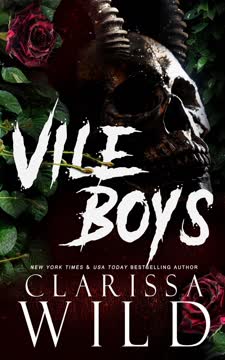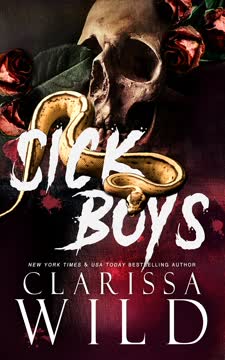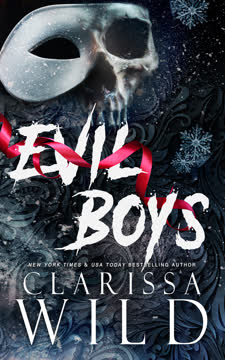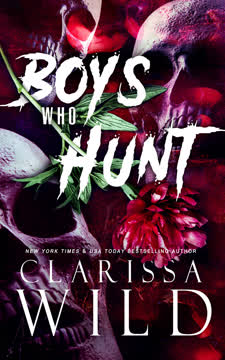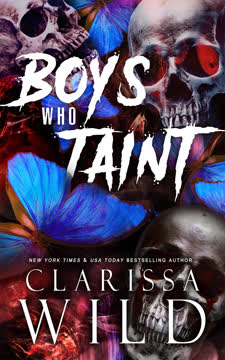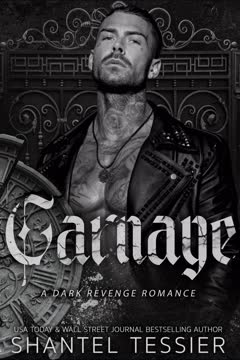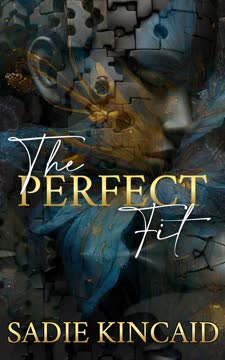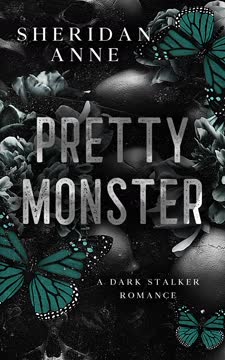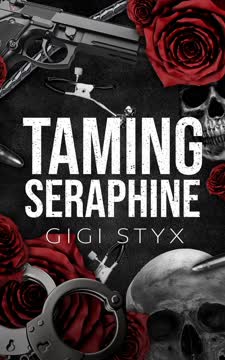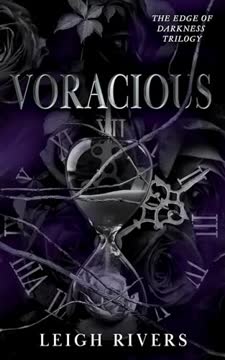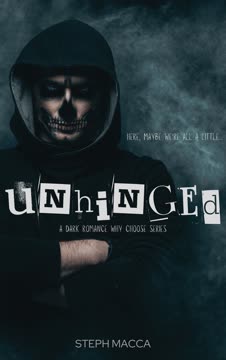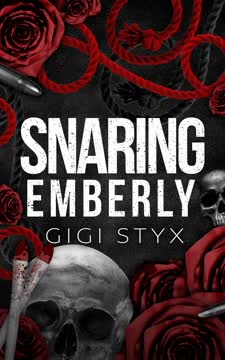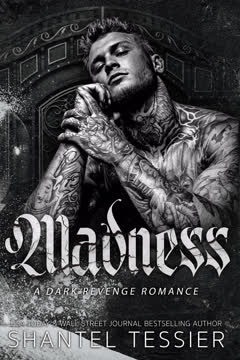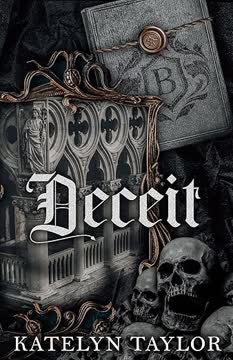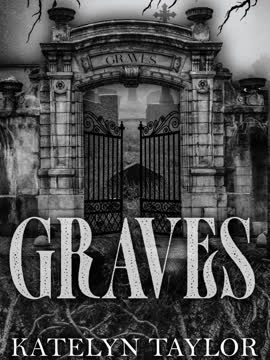Plot Summary
Roses and Ruin
Crystal Murphy, a diligent student and dutiful daughter, enters the world of Spine Ridge University, hoping for a fresh start after her father's tragic death. But beneath the campus's beauty, danger lurks. At a lavish party thrown by the infamous Tartarus House, Crystal's life collides with three enigmatic, dangerous men—Ares, Caleb, and Blaine. Their presence is magnetic and menacing, and the night's festivities are a prelude to a descent into violence and obsession. Crystal's world, once filled with roses and hope, is about to be torn apart by the thorns of secrets and the allure of ruin.
The Night of Witness
Amidst the revelry, Crystal stumbles upon a brutal execution at the hands of the Tartarus boys. She becomes the sole witness to their crime, her innocence forever tainted by the sight of blood and the coldness in Ares's eyes. The boys, self-proclaimed gods of their own purgatory, let her go—but not without a warning. Crystal's fear is palpable, but so is her fascination. The knowledge she carries is a death sentence, and the boys' attention turns predatory. The night marks the beginning of a dangerous game, where silence is survival and desire is a weapon.
Chased by Devils
Crystal's every step is shadowed by the Tartarus trio. Ares, Caleb, and Blaine close in, their intentions unclear—punishment, pleasure, or both. Crystal's attempts to return to normalcy are futile; the boys' presence is inescapable. Their games escalate from psychological torment to physical pursuit, blurring the line between threat and seduction. Crystal is forced to confront her own fear, her body's betrayal, and the intoxicating power these devils hold over her. The chase is on, and there is no safe haven.
The Maze and the Mask
At a masked party, Crystal is drawn deeper into the Tartarus boys' web. The anonymity of masks emboldens both predator and prey. Ares corners her, his dominance both terrifying and thrilling. Caleb and Blaine circle, each playing their part in the trio's twisted courtship. Crystal's resistance is tested as pleasure and pain intertwine. The maze becomes a metaphor for her entrapment—every turn leads her back to them, and every escape is an illusion.
Games of Power
The boys escalate their torment, pushing Crystal to her limits in public and private. Humiliation becomes a tool of control, and Crystal's body betrays her with arousal she cannot deny. The power dynamic shifts as she learns to wield her own weapons—her intelligence, her defiance, and eventually, her desire. The games are no longer one-sided; Crystal's hatred becomes a source of strength, and her yearning a weapon. The boundaries between captor and captive blur, and the stakes grow ever higher.
The Price of Silence
When the boys threaten her mother's life, Crystal is forced to make an impossible choice: her family's safety in exchange for her submission. She becomes their willing captive, trading her autonomy for protection. The arrangement is transactional, but the emotions it stirs are anything but simple. Crystal's hatred for the boys is matched only by her craving for their touch. The price of silence is her body, her pride, and perhaps, her soul.
Seduction and Submission
The Tartarus boys initiate Crystal into their world of debauchery. Each encounter is a battle of wills, a test of endurance, and a lesson in surrender. Ares's dominance is absolute, Caleb's sadism intoxicating, and Blaine's charm disarming. Crystal learns to find power in her submission, to turn her hatred into fuel for survival. The lines between victim and accomplice blur as she discovers the dark ecstasy of being owned—and the thrill of making even gods kneel.
The Deal and the Debt
As Crystal's mother becomes entangled with Caleb's father, the web of secrets tightens. The threat of exposure looms, and the boys' obsession with Crystal deepens. The past and present collide as old wounds are reopened and new debts are incurred. Crystal's quest for vengeance is complicated by her growing feelings for her captors. The deal she struck to save her mother becomes a chain binding her to the Tartarus boys—and to her own darkest desires.
Blood on the Window
The boys' surveillance of Crystal becomes literal as Caleb watches her in her most private moments, leaving evidence of his presence in the most intimate way. The violation is both terrifying and arousing, forcing Crystal to confront the depth of her own corruption. The boundaries of privacy, consent, and control are shattered. The boys' power over her is total, but Crystal's resolve only hardens. She will not be broken—she will break them.
The Goddess Awakens
Crystal's journey from victim to goddess is marked by blood, tears, and ecstasy. She learns to wield the weapons the boys gave her, both literal and metaphorical. Training with Blaine, she discovers her own capacity for violence and seduction. The girl who once smiled to survive now smiles to conquer. The goddess within her awakens, demanding worship—and vengeance. The boys, once her tormentors, become her disciples.
The Auction Block
Crystal is kidnapped and sold at a human auction, her body commodified by the same underworld that claimed her father. The ultimate violation is averted only by the intervention of the Tartarus boys, who risk everything to buy her freedom. The rescue is a bloodbath, and the cost is high. Crystal's trauma is both deepened and transformed—she is no longer a pawn, but a queen who demands retribution. The auction block becomes her throne.
The Rescue and the Reckoning
The boys and their unlikely allies wage war on The Bones Brotherhood and the Torres patriarch. The rescue of Crystal is a crucible, forging unbreakable bonds and exposing old wounds. The violence is cathartic, but the reckoning is not yet complete. Crystal must confront the truth about her father's death, the boys' complicity, and her own capacity for darkness. The line between justice and revenge blurs, and the final act of violence is hers to claim.
The Whip and the Knife
Ares is captured and tortured by his own father, the scars of his past laid bare. Crystal, Caleb, and Blaine risk everything to save him, storming the casino in a hail of bullets and blades. The rescue is a crucible for all involved, testing the limits of loyalty, love, and endurance. The whip and the knife become symbols of both suffering and survival. The truth about Ares's sacrifices—and the pain he endured for Crystal's sake—is finally revealed.
The Truth Carved in Flesh
In the aftermath, Ares bares his soul and his body, revealing the scars he carries for Crystal. The truth about her father's death is laid bare: Ares did not kill him, but suffered for refusing to do so. The revelation shatters Crystal's hatred and replaces it with understanding—and love. The knife that once symbolized vengeance becomes a tool of belonging, as Crystal carves her own mark to match Ares's. Forgiveness is not easy, but it is earned in blood.
The End of the Patriarch
The final confrontation with the Torres patriarch is a storm of violence and catharsis. Crystal, empowered by her own transformation, delivers the killing blow, ending the cycle of abuse and vengeance. The death of the patriarch frees not only Ares, but also Kai, Caleb, and Crystal herself. The family is remade in blood, and the survivors are left to pick up the pieces. The end of the old order is the beginning of something new.
The Choice to Stay
With the chains of the past broken, Crystal is finally free to choose her own fate. The boys, once her captors, now offer her devotion and worship. The choice to stay is hers alone, and she claims it with pride. The love between Crystal, Ares, Caleb, and Blaine is unconventional, but it is real. Together, they forge a new family, bound not by blood or violence, but by choice and desire.
The Mark of Belonging
In a final act of devotion, Crystal allows Ares to carve his name into her skin, matching the scars he bears for her. The ritual is both painful and ecstatic, a testament to their mutual ownership and love. The boys worship her as their goddess, and she claims them as her own. The mark of belonging is not just physical, but spiritual—a promise that they will never be parted, no matter what trials await.
Fear, Love, and Forever
The story ends not with vengeance, but with acceptance. Crystal, once a girl haunted by fear and hatred, is now a woman worshipped by gods and devils alike. The boys, once her tormentors, are now her lovers and disciples. Together, they embrace a future built on choice, desire, and the scars they share. The cycle of violence is broken, and in its place blooms a love as fierce and enduring as the roses that first marked Crystal's journey.
Characters
Crystal Murphy
Crystal is the heart of the story—a girl marked by tragedy, driven by vengeance, and transformed by desire. Her father's murder sets her on a collision course with the Tartarus boys, and her journey from victim to goddess is both harrowing and empowering. Crystal's relationships are complex: she is both prey and predator, lover and avenger. Her psychological arc is one of survival, adaptation, and ultimately, self-actualization. She learns to wield her pain as power, her hatred as fuel, and her love as a weapon. Her connection to Ares is especially fraught, blending trauma, obsession, and redemption. By the end, Crystal is no longer defined by what was done to her, but by what she chooses to become.
Ares Torres
Ares is the dark heart of Tartarus—a man forged in violence, scarred by his father's abuse, and obsessed with control. His relationship with Crystal is a battleground of dominance and surrender, but beneath his cruelty lies a desperate need for love and acceptance. Ares's psychological wounds run deep: he is haunted by the pain he endured for refusing to kill Crystal's father, and by the knowledge that he is both victim and perpetrator. His arc is one of revelation and vulnerability, as he learns to kneel before the woman he once sought to break. Ares's love for Crystal is both his salvation and his undoing, and his willingness to suffer for her marks his ultimate transformation.
Caleb Preston
Caleb is the wild card of the trio—a man who finds pleasure in pain, both given and received. His family history is fraught: a comatose mother, a distant father, and a desperate need for control. Caleb's relationship with Crystal is marked by rivalry, obsession, and a shared hunger for danger. He is both her tormentor and her protector, and his journey is one of learning to love without destroying. Caleb's bond with Ares is equally complex, blending love, jealousy, and codependence. By the end, Caleb finds peace not in violence, but in the acceptance of his own vulnerability and the love he shares with Crystal and Ares.
Blaine Navarro
Blaine is the most flamboyant and emotionally open of the Tartarus boys. A martial artist and a lover of pleasure, he is both a seducer and a caretaker. Blaine's loyalty to Ares is rooted in a life debt, but his love for Crystal is genuine and transformative. He serves as both comic relief and emotional anchor, helping Crystal discover her own strength and capacity for violence. Blaine's pansexuality and openness to love in all forms make him the glue that binds the group together. His willingness to take a bullet for Ares and to submit to Crystal's desires marks his growth from playboy to devoted partner.
Jonathan Preston
Caleb's father is a man adrift after his wife's long illness and death. His relationship with Crystal's mother is both a source of hope and a catalyst for conflict. Jonathan's inability to let go of the past mirrors Caleb's own struggles, and his eventual decision to end the relationship reflects a desire to heal rather than escape. He serves as a reminder of the generational cycles of grief and the difficulty of moving on.
Abigail Murphy
Crystal's mother is a figure of resilience and longing. Her relationship with Jonathan is a chance at new love, but it is complicated by the traumas of the past and the dangers of the present. Abigail's devotion to Crystal is unwavering, and her willingness to pursue happiness in the face of loss is both inspiring and bittersweet. She represents the possibility of healing, even when the wounds run deep.
Kai Torres
Kai is Ares's half-brother and the chosen heir of the Torres empire. His relationship with Ares is fraught with jealousy, misunderstanding, and eventual reconciliation. Kai's journey is one of awakening to the truth of his father's cruelty and choosing to stand with his brother rather than against him. His role in the final reckoning is pivotal, as he helps bring an end to the cycle of abuse and claims his own agency.
Mr. Torres (The Patriarch)
The Torres patriarch is the story's ultimate villain—a man who wields power through violence, manipulation, and fear. His abuse of Ares is both physical and psychological, and his willingness to kill for profit sets the story's tragedies in motion. His death at Crystal's hands is both justice and liberation, ending the reign of terror and allowing the survivors to forge a new path.
Penelope, Lana, Nathan, Milo, Felix, Dylan, Alistair
These supporting characters form the extended family that helps Crystal and the boys survive and fight back. Each brings their own strengths, traumas, and loyalties to the table. Their presence underscores the importance of chosen family and the power of solidarity in the face of violence and corruption.
The Bones Brotherhood
The Bones Brotherhood represents the external threat that forces the protagonists to unite. Their role as traffickers and murderers is a dark mirror to the internal violence of the Tartarus House. Their defeat is both a literal and symbolic victory over the forces that seek to commodify and destroy the vulnerable.
Plot Devices
The Maze and the Mask
The recurring motif of the maze—both literal and metaphorical—serves as a symbol of Crystal's entrapment and the boys' predatory games. The use of masks at parties and during hunts blurs the lines between hunter and hunted, victim and perpetrator. These devices heighten the sense of danger and erotic tension, allowing characters to explore hidden aspects of themselves. The maze also foreshadows the inescapability of fate and the cyclical nature of violence and desire.
The Knife and the Scar
The knife is both a weapon and a tool of belonging. Its presence marks moments of threat, but also of connection—Ares's refusal to kill, Crystal's carving of his name, and the mutual exchange of scars. Scars become a language of love and sacrifice, a way for characters to communicate what words cannot. The act of marking and being marked is both a surrender and a claim, binding the characters together in pain and pleasure.
The Auction and the Rescue
The human auction is the story's nadir—a moment when Crystal is reduced to an object, her agency stripped away. The rescue by the Tartarus boys is both a literal and symbolic reclamation of her autonomy. The violence of the rescue is cathartic, but it also forces the characters to confront the darkness within themselves. The auction block becomes a crucible, forging new bonds and exposing old wounds.
The Whip and the Patriarch
The whip is the instrument of the Torres patriarch's control, used to enforce obedience and inflict pain. Its presence is a constant reminder of the power dynamics at play, and its eventual turning against the patriarch marks the end of his reign. The breaking of the whip's hold is both a personal and collective liberation, allowing the survivors to forge a new family free from the violence of the past.
The Smile and the Fear
Crystal's smile is her shield, her weapon, and her curse. It is the thing that first draws Ares's obsession, the thing he seeks to destroy, and ultimately, the thing that saves them both. The interplay of fear and desire is central to the story's psychological tension. Fear is both a tool of control and a catalyst for transformation. The reclamation of fear—turning it into power, pleasure, and love—is the story's ultimate act of defiance.
Analysis
Vile Boys is a dark, unflinching exploration of power, trauma, and transformation. At its core, the novel interrogates the ways in which violence—both physical and psychological—can destroy, but also remake, the self. Crystal's journey from victim to goddess is a testament to the resilience of the human spirit and the complexity of desire. The story refuses easy answers: love is inseparable from pain, pleasure from humiliation, and survival from complicity. The relationships between Crystal, Ares, Caleb, and Blaine are fraught with danger, but also with the possibility of healing. The novel's use of extreme plot devices—public humiliation, human trafficking, torture—serves to heighten the stakes and force characters to confront their own darkness. Ultimately, Vile Boys is a meditation on the power of choice: the choice to survive, to forgive, to love, and to claim one's own story. It is a brutal, erotic, and deeply psychological tale that challenges readers to question the boundaries of morality, agency, and redemption.
Last updated:
Review Summary
Vile Boys is a dark romance novel featuring Crystal and three dangerous men: Ares, Blaine, and Caleb. Readers praise the intense spice, complex characters, and twisting plot, though some found it cringey or poorly written. Many enjoyed the character development, particularly Crystal's transformation. The book includes various kinks and multiple-partner scenes. While some readers struggled with the writing style or content, others found it a thrilling addition to the Spine Ridge University series, appreciating the author's ability to create morally gray characters and steamy scenarios.
Spine Ridge University Series
Similar Books
Download PDF
Download EPUB
.epub digital book format is ideal for reading ebooks on phones, tablets, and e-readers.
